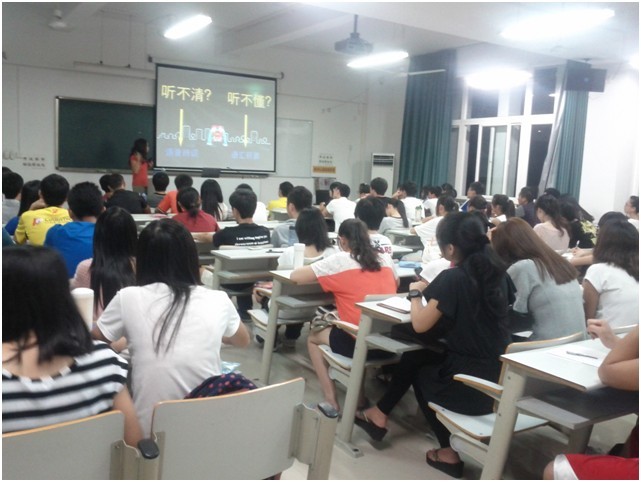 返回
教育头条
返回
教育头条

英语四六级听力阅读分享
今天小编给大家带来了英语四级新闻听力的相关练习,希望对大家的英语听力有所帮助。
1.
A. Governments increase social media use to influence elections.
B. Social media companies use bots and false accounts to influence elections.
C. Hackers use disinformation and propaganda to influence elections.
D. Presidential candidates use disinformation and propaganda to hurt opponents.
2.
A At least 38.
B. At least 65.
C. At least 40.
D. At least 30.
二、听力文本
A rights group reports that governments and individuals have sought to influence elections online in 26 of 30 national elections it studied. Freedom House released the report about online influence on Monday – one day before elections in many parts of the United States. The new report warns that internet-based election interference has become an important method for those seeking to attack democracy. It found that disinformation and propaganda were the most popular tools used to influence elections. Freedom House studied how domestic governments have tried to influence their citizens. It said that such individuals often work with popular media personalities and business leaders. Some of those seeking to influence elections had developed methods to defeat efforts by technology companies to fight false or misleading information, the report said. The report noted that online disinformation was widely used during several political events in the United States, such as the 2018 elections. Another example was the U.S. Senate hearings for Supreme Court nominee Brett Kavanaugh. Freedom House noted a rise in the number of governments using bots and false accounts to shape online opinions and hurt opponents. Such behavior was noted in 38 out of 65 countries that the report discussed. Social media was also being increasingly used to watch citizens. The report said at least 40 countries have set up high-level social media monitoring programs.
Question 1: What’s the main idea of this news report?
Question 2: According to the news report, how many countries have set up high-level social media monitoring programs?

三、重点词汇
1. interference: an occasion when someone tries to interfere in a situation 干涉,干预
2. disinformation: false information spread in order to deceive people 假信息,假情报
3. propaganda: information, ideas, opinions, or images, often only giving one part of an argument, that are broadcast, published, or in some other way spread with the intention of influencing people's opinions 宣传;鼓吹
4. hearing: an official meeting that is held to collect the facts about an event or problem 听证会;意见听取会
5. nominee: someone who has been nominated for something 被提名者
6. bot: a computer program that works automatically, especially one that searches for and finds information on the internet (能自动执行特定任务的)网上机器人程序(尤指在互联网上搜索信息)
7. opponent: a person who disagrees with something and speaks against it or tries to change it 反对者
1.
A. Governments increase social media use to influence elections.
B. Social media companies use bots and false accounts to influence elections.
C. Hackers use disinformation and propaganda to influence elections.
D. Presidential candidates use disinformation and propaganda to hurt opponents.
2.
A At least 38.
B. At least 65.
C. At least 40.
D. At least 30.
二、听力文本
A rights group reports that governments and individuals have sought to influence elections online in 26 of 30 national elections it studied. Freedom House released the report about online influence on Monday – one day before elections in many parts of the United States. The new report warns that internet-based election interference has become an important method for those seeking to attack democracy. It found that disinformation and propaganda were the most popular tools used to influence elections. Freedom House studied how domestic governments have tried to influence their citizens. It said that such individuals often work with popular media personalities and business leaders. Some of those seeking to influence elections had developed methods to defeat efforts by technology companies to fight false or misleading information, the report said. The report noted that online disinformation was widely used during several political events in the United States, such as the 2018 elections. Another example was the U.S. Senate hearings for Supreme Court nominee Brett Kavanaugh. Freedom House noted a rise in the number of governments using bots and false accounts to shape online opinions and hurt opponents. Such behavior was noted in 38 out of 65 countries that the report discussed. Social media was also being increasingly used to watch citizens. The report said at least 40 countries have set up high-level social media monitoring programs.
Question 1: What’s the main idea of this news report?
Question 2: According to the news report, how many countries have set up high-level social media monitoring programs?

三、重点词汇
1. interference: an occasion when someone tries to interfere in a situation 干涉,干预
2. disinformation: false information spread in order to deceive people 假信息,假情报
3. propaganda: information, ideas, opinions, or images, often only giving one part of an argument, that are broadcast, published, or in some other way spread with the intention of influencing people's opinions 宣传;鼓吹
4. hearing: an official meeting that is held to collect the facts about an event or problem 听证会;意见听取会
5. nominee: someone who has been nominated for something 被提名者
6. bot: a computer program that works automatically, especially one that searches for and finds information on the internet (能自动执行特定任务的)网上机器人程序(尤指在互联网上搜索信息)
7. opponent: a person who disagrees with something and speaks against it or tries to change it 反对者
英语四六级听力阅读分享,如果你喜欢这篇文章,请将其保留版权转载。我的微信号(18560125702)欢迎来咨询,10年教培行业工作经验,如果你在四级六级考试方面有疑问,请与我联系,我将为您提供全面专业的选课帮助。返回教育宝头条
【免责声明】本文仅代表作者本人观点,与教育宝无关。教育宝对文中陈述、观点判断保持中立,不对所包含内容的准确性、可靠性或完整性提供任何保证。请读者仅作参考,特此声明!





